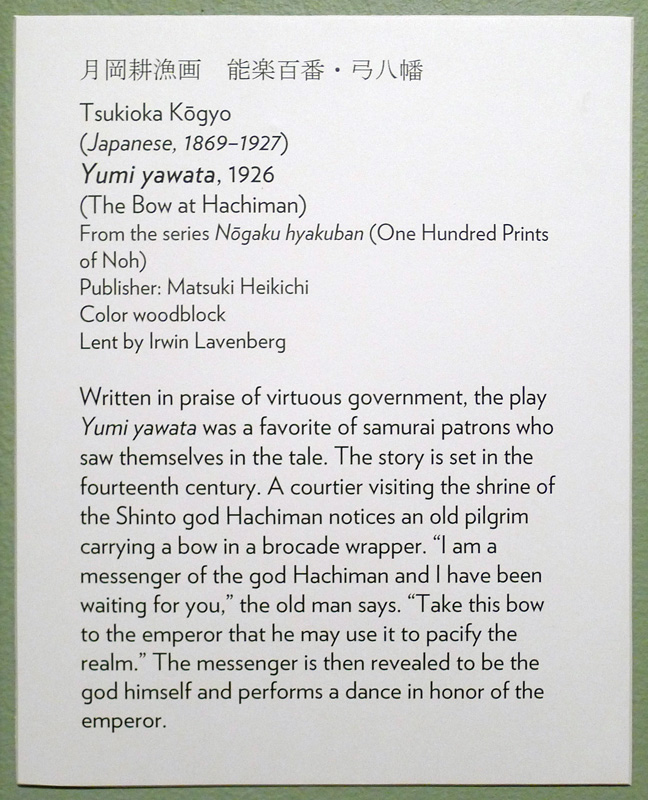About This Print
One of 120 prints issued as part of the series Nōgaku hyakuban (One Hundred Prints of Noh), it depicts a scene from the play Yumi Yawata by the playwright Zeami Motokiyo (1363-1443). "In the print, the god dances. The drum player is on the right, along with two retainers. This work...represents an open-air night performance (takigi nō), which according to the inscription, Uzen no kuni, Kurokawa Nō, was held during the Kurokawa Nō festival in the province Uzen no kuni (Tsuroka [Yamagata])."1This print was originally released by the publisher Matsuki Heikichi in the 40th and final installment of prints in this series. This series' prints were offered in monthly installments consisting of three prints packaged in an envelope with additional descriptive information.2
The Play - Yumi Yawata (The Bow at Hachiman) by Zeami
Yumi Yawata is a two act play centering on a warrior’s bow wrapped in a brocade bag. The maejite, an old man, appears with the bow at the Iwashimizu Hachiman Shrine in Kyoto and presents it to the waki, a retainer of the Ex-Emperor Gouda (1267-1324), to be offered up to His Majesty. As the shite explains: “Among the historical precedents of the land of China, brought to peaceful rule under the Zhou, one finds the precedent of wrapping one’s bow and arrows in a bag and shutting away one’s lance and shield. Accordingly, I have stuffed this bow into a bag and put my sword away in a box; these very actions are a sign of our lord’s age of great peace.”3According to the recorded words of Zeami, the author of the play, the play was written “in honor of the inaugural celebration for the reign of the present shogun." However, it has been surmised that the play has imperial overtones and is anti-shogunal, the following passage (sung by the shite) being cited:
May the emperor’s reign endure
For a thousand years,
For thousands of years,
Till small pebbles become a large boulder
Covered with moss.
May it endure forever
Like the color of the pine needles
On Eternity Mountain.
The azure sky is calm,
The emperor secure,
The people are kind-hearted,
Passes have not been closed.
From the beginning, our has been a land
Where the gods protect the emperor
The vow of this god in particular
Illumines the night
Like the light of the moon.
The waters of Iwashimizu flow ceaselessly,
And as long as the stream runs on
Living beings are released.
How glorious is the god’s compassion!
Truly this is an auspicious time.4
1 The Beauty of Silence: Nō and Nature Prints by Tsukioka Kōgyo (1869-1927), Robert Schaap & J. Thomas Rimer, Hotei Publishing, 2010, p. 94.
2 “The series Nogaku hyakuban (100 No plays) by Tsukioka Kogyo (1869-1927),” Claus-Peter Schulz, Andon
67, Society for Japanese Arts, p. 28.
3 Zeami's Style: The Noh Plays of Zeami Motokiyo, Thomas Blenman Hare, Stanford University Press, 1986, p. 104.
4 Theatricalities of Power: The Cultural Politics of Noh, Steven T. Brown, Stanford University Press, 2001, p. 95-96.
4 Theatricalities of Power: The Cultural Politics of Noh, Steven T. Brown, Stanford University Press, 2001, p. 95-96.
Special Exhibition
NOH Dance Drama of the Samurai NOV 17, 2012 – FEB 24, 2013
| IHL Catalog | #152 |
| Title | Yumi yawata 弓八幡 (The Bow at the Hachiman Shrine) |
| Series | Nōgaku hyakuban 能楽百番 (One Hundred Prints of Noh or One Hundred Noh Plays) |
| Artist | Tsukioka Kōgyo (1869-1927) |
| Signature | Kōgyo |
| Seal |  Kōgyo, seal no. 49, p. 171 in The Beauty of Silence: Nō and Nature Prints by Tsukioka Kōgyo (1869-1927), Robert Schaap & J. Thomas Rimer, Hotei Publishing, 2010. Kōgyo, seal no. 49, p. 171 in The Beauty of Silence: Nō and Nature Prints by Tsukioka Kōgyo (1869-1927), Robert Schaap & J. Thomas Rimer, Hotei Publishing, 2010. |
| Date | September 1926 |
| Edition | unknown |
| Publisher | Matsuki Heikichi (Daikokuya) |
| Carver | |
| Impression | excellent |
| Colors | excellent |
| Condition | good - backed and trimmed |
| Genre | ukiyo-e |
| Miscellaneous | Portland Art Museum loan number L2012.113.14 |
| Format | oban tate-e |
| H x W Paper | 14 5/8 x 9 5/8 in. (37.1 x 24.4 cm) |
| Collections This Print | Scripps College 2007.1.50; Art Institute of Chicago 1943.833.50 |
| Reference Literature | The Beauty of Silence: Nō and Nature Prints by Tsukioka Kōgyo (1869-1927), Robert Schaap & J. Thomas Rimer, Hotei Publishing, 2010, p. 94. |



